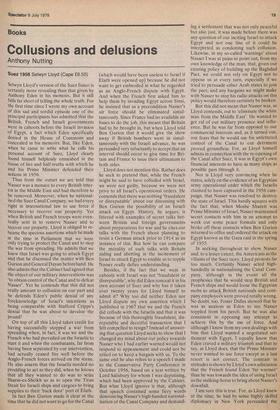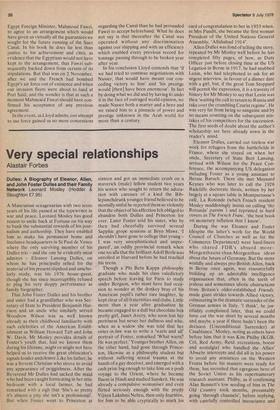Books
Collusions and delusions
Anthony Nutting
Suez 1956 Selwyn Lloyd (Cape £6.50) Selwyn Lloyd's version of the Suez fiasco is certainly more revealing than that given by Anthony Eden in his memoirs. But it still falls far short of telling the whole truth. For the first time since I wrote my own account of this sad and sordid episode one of the principal participants has admitted that the British, French and Israeli governments were in cahoots before the Israeli invasion of Egypt, a fact which Eden specifically denied in the House of Commons and concealed in his memoirs. But, like Eden, when he came to wilte what he calls his personal account of Suez, Lloyd clearly found himself helplessly enmeshed in the tissue of lies and half-truths with which he and his Prime Minister defended their actions in 1956.
Thus from the outset we are told that Nasser was a menace to every British interest in the Middle East and had therefore to be removed. Moreover, when he nationalised the Suez Canal Company, we had every right in international law to use force if necessary to recover our property. Yet when British and French troops were eventually sent in to remove Nasser and to recover our property, Lloyd is obliged to rehearse the specious assertions which he made at the time in Parliament that we were only trying to protect the Canal and to stop the war from spreading. He admits that we knew that Israel was going to attack Egypt and that he discussed the matter with Ben Gurion and General Dayan beforehand. He also admits that the Cabinet had agreed that the object of our military interventions was 'to obtain control of the Canal and to defeat Nasser'. Yet he contends that this did not really amount to collusion on our part and he defends Eden's public denial of any foreknowledge of Israel's intentions as being comparable with Stafford Cripps's denial that he was about to devaluethe pound!
On top of all this Lloyd takes credit for having successfully stopped a war from spreading when, in fact, it was we and the French who had prevailed on the Israelis to start it and when the combatants, far from having been separated by our intervention, had actually ceased fire well before the Anglo-French forces arrived on the scene. He also asserts that the Israelis needed no prodding to act as they did, when he knows that all they wanted to do was to seize Sharm-es-Sheikh so as to open the Tiran Strait for Israeli ships and cargoes to bring supplies to their 'back door' port of Elath.
In fact Ben Gurion made it clear at the time that he did not want to go for the Canal (which would have been useless to Israel if Elath were opened up) because he did not want to get embroiled in what he regarded as an Anglo-French dispute with Egypt. And when the French first asked him to help them by invading Egypt across Sinai, he insisted that as a precondition Nasser's air force should be eliminated simultaneously. Since France had no available air bases to do the job, this meant that Britain had to be brought in, but when Lloyd told Ben Gurion that it would give the show away if British bombers went in simultaneously with the Israeli advance, he was persuaded very reluctantly to accept that an interval should occur to give time for Britain and France to issue their ultimatum to both sides.
Lloyd does not mention this. Rather does he seek to pretend that, while the French might be said to have colluded with Israel, we were not guilty, because we were not privy to all Israel's operational orders. He contends that there was nothing 'fraudulent or disreputable' about our discussing with Ben Gurion the possibility of an Israeli attack on Egypt. History, he argues, is littered with examples of secret talks between Britain and foreign governments abOut preparations for war and he cites our talks with the French about planning to resist a German attack prior to 1914 as an instance of this. But how he can compare the mOrality of such talks with Britain aiding and abetting in the incitement of Israel to attack Egypt to enable us to topple Nasser really defies understanding.
Besides, if the fact that we were in cahoots with Israel was not 'fraudulent or disreputable', why did Eden conceal it in his own account of Suez and why has it taken over twenty years for Lloyd himself to admit it? Why too did neither Eden nor Lloyd dispute my own assertion which I published in 1967 that we and the French did collude with the Israelis and that it was because of this thoroughly fraudulent, disreputable and deceitful transaction that I felt compelled to resign? Instead of answering that question Lloyd seeks to show that! changed my mind about our policy towards Nasser who I had earlier warned would not respond to appeasement and could not be relied on to keep a bargain with us. To the same end he also refers to a speech I made to the Conservative Party Conference in October 1956, based on a text written by Lord Salisbury for whom I was deputising, which had been approved by the Cabinet. But what Lloyd ignores is that, although that speech contained some fiery words denouncing Nasser's high-handed nationalisation of the Canal Company and demand
ing a settlement that was not only peaceful but also just, it was made before there was any question of our inciting Israel to attack Egypt and not one line of it could be interpreted as condoning such collusion. Likewise, in my so-called 'warnings' about Nasser I was at pains to point out, from my own knowledge of the man, that, given our existing policy of building up the Baghdad Pact, we could not rely on Egypt not to oppose us at every turn, especially if we tried to persuade other Arab states to join the pact; and any bargains we might make with Nasser to stop his radio attacks on this policy would therefore certainly be broken.
But this did not mean that Nasser was, as Lloyd contends, out to 'eliminate the white man from the Middle East'. He wanted to get rid of our military presence and influence. But he was far from opposed to our commercial interests and, as it turned out, our fears that he would use his unfettered control of the Canal to our detriment proved groundless. For, as Lloyd himself admits in connection with the re-opening of the Canal after Suez, it was in Egypt's own financial interests to have as many ships as possible pass through it.
Nor is Lloyd very convincing when he states, solely on the evidence of an Egyptian army operational order which the Israelis claimed to have captured in the 1956 campaign, that Nasser was resolved to destroy the state of Israel. This hardly squares with the fact that, when Moshe Sharett was Prime Minister of Israel, Nasser maintained secret contacts with him in an attempt to work out some peace formula and only broke off these contacts when Ben Gurion returned to office and ordered the attack on Egypt known as the Gaza raid in the spring of 1955.
In seeking throughout to show Nasser and, to a lesser extent, the Americans as the villains of the Suez story, Lloyd protests far too much. Certainly Nasser acted highhandedly in nationalising the Canal Company, although in the event all the prophesies that he would stop British and French ships and would loose the Egyptian mobs to attack British nationals and conipany employees were proved totally wrong. No doubt, too, Foster Dulles showed that he was as anxious as Eden to see Nasser toppled from his perch. But he was also consistent in opposing any attempt to achieve this by the use of force. And although I know from my own dealings with him that Lloyd wanted a negotiated settlement with Egypt, I equally know that Eden craved a military triumph and that to say, as Lloyd does, that the Prime Minister never wanted to use force except as a last resort is not correct. The contrast in attitudes is shown by Lloyd's own admission that the French found Eden 'far warmer' than he was towards the idea of using Israel as the stalking-horse to bring about Nasser's downfall.
I am sure this is true. For, as Lloyd knew at the time, he had by some highly skilful diplomacy in New York persuaded the Egypt Foreign Minister, Mahmoud Fawzi, to agree to an arrangement which would have given us virtually all the guarantees we sought for the future running of the Suez Canal. In his book he does far less than justice to his achievement and cites, as evidence that the Egyptians would not have kept to the arrangement, that Fawzi subsequently backed down from certain of its stipulations. But that was on 2 November, after we and the French had bombed Egypt's air force out of existence and when our invasion fleets were about to land at Port Said; and the wonder is that at such a moment Mahmotid Fawzi should have confirmed his acceptance of any previous agreement.
In the event, as Lloyd admits, our attempt to use force gained us no more concessions regarding the Canal than he had persuaded Fawzi to accept beforehand. What he does not say is that thereafter the Canal was operated without any discrimination against our shipping and with an efficiency which enabled every previous record for tonnage passing through to be broken year after year.
In his conclusion Lloyd contends that 'if we had tried to continue negotiations with Nasser, that would have meant our conceding victory to him' and 'his prestige would [then] have been enormous'. In fact by doing what we did and by having to undo it in the face of outraged world opinion, we made Nasser both a martyr and a hero and we raised him to a pinnacle of power and prestige unknown in the Arab world for more than a century.



































 Previous page
Previous page